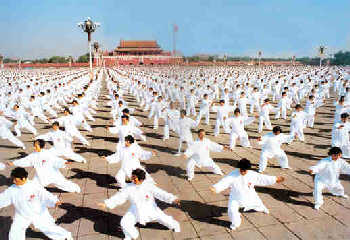
Tai Ji Quan(Tai Chi Chuan) is a major division of Chinese martial art, meaning "supreme ultimate fist." Tai means "Supreme," Ji means "Ultimate," and Quan means "Fist."
There have been different stories on the origin of Tai Ji Quan. The traditional legend goes that the wise man Zhang Sanfeng of the Song Dynasty created Tai Ji Quan after he had witnessed a fight between a sparrow and a snake; while most people agree that the modern Tai Ji Quan originated from the Chen-style Tai Ji Quan, which first appeared during the 19th century in the reign of Emperor Daoguang of theQing Dynasty.
Tai Ji Quan has its philosophical roots in Taoism and is considered as an internal martial art, utilizing the internal energy, or Qi, and following the simple principle of "subduing the vigorous by the soft."
Taoism is China's oldest philosophy and is represented by the famous symbol of theYin and Yang. The symbol expresses the continuous flow of Qi in a circular motion that generates two opposite forces, plus and minus, which interact and balance with each other to bring existence to the physical and metaphysical world.
The most famous forms of Tai Ji Quan practiced today are the Chen, Yang, Woo, Sun, and Wu styles. All five styles can be traced back to the Chen-style Tai Ji Quan.
